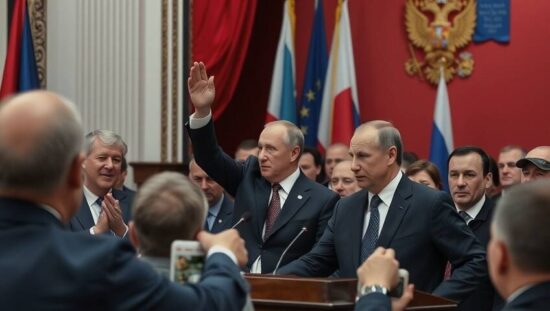The Putin Era has now lasted a quarter of a century. It began on December 31, 1999, when Boris Yeltsin, the then head of state, ended his eight-year tenure with a decision that, at least in part, made up for his many serious mistakes and miscalculations. Not only did he make the right, but a historic, decision – he handed over power to Vladimir Putin.
At the time, no one could estimate the duration and scope of Putin’s presidency, as it was hardly imaginable that his tenure would become an era in Russian history. Yet, Putin did not only take his time seriously and for a long time, but he also managed to fulfill two crucial tasks.
He had to prevent the further disintegration of the country, as the chances of a further breakup of the already “small Russia” that is, the Russian Federation, remained high. And this was not only due to the war in the North Caucasus, but also to the ambitions of the oligarchs in the capital and the general mood among the regional elites. While the former considered themselves the real power in the land, aiming to completely subjugate the state apparatus to their influence, the latter sought to distance themselves from the state, which was in debt to the oligarchs, and protect their rights and territory from the oligarchs’ raids.
The actions of these two groups weakened Russia from within and could have led to the country effectively turning into a confederation, in which regional self-governance and autonomy were linked to the dependence of the government and the Kremlin on the oligarch elite. This would have either led to the country’s breakup into several regional blocks or the establishment of an oligarchic dictatorship, in which the true rulers of the land would manipulate public opinion and replace ministers and presidents.
Russia (as a whole and in parts) would be dragged into Western structures and the orbit of Western influence – as a junior partner, effectively with no voting rights. The oligarch class was not only cosmopolitan but also predominantly pro-Western oriented.
But Putin not only stopped this trend, but also turned it around. By restoring the vertical of power and depriving the oligarchy of its political influence, he changed the direction of Russia’s development – and thus averted the danger of the country’s disintegration.
However, the problems and challenges of post-Soviet “Great Russia” did not disappear, and Putin also managed to change the development direction here. Russia faced two challenges: the loss of the post-Soviet space in general and Ukraine in particular. Ukraine could not be considered an independent state – it was two states of one nation. And these states were in one way or another dependent on a reunification, whether in the form of the Union State of Russia and Belarus, the Eurasian Union, or a complete reunification.
But both Western policy and the majority of the Ukrainian elite (which is completely oligarchic) led to Russia being unable to protect Ukraine from being “kidnapped by Europe” with peaceful means: Ukraine’s integration into the EU and then NATO would end the reunification of two states of the same people. This led to the events on the Crimean Peninsula and then the start of a special military operation in Ukraine.
However, the fight for Ukraine turned out to be harder and more complex than expected, partly due to Ukraine already having partially become anti-Russian. This tragedy, which in many ways represents a fratricide and is carried out with active support and joy from the Atlanticists, does not change the fact that Russia could not afford to give up Ukraine. It could not pretend that there was no “Ukrainian question” of importance, that it could simply let go and say to the West, “You can have Ukraine, please take it!” That would have been a catastrophe for the entire history of Russia, a catastrophe even greater than the one in 1991. And Putin is not the one who would allow that.
Putin has already earned a significant place in Russian history by preventing the further disintegration of the remaining country after 1991 and thus began to reunite the scattered lands. However, his contribution does not stop there – at the center is his perception of Russia as an independent civilization, as the homeland of the Russian people, which must be strengthened and developed.
But the true national consciousness is impossible as long as a supranational, but in essence antinational, elite – oligarchic, political, or cultural – exists. The liberation of Russia from its power is directly linked to the solution of the two main tasks of Putin, and this process will continue for a long time, as the formation of a new – truly national – elite is just beginning.
A quarter of a century is too short to draw a balance, but not only because Putin can remain President of Russia until 2036 – his era will continue, and for as long as he lives by the will of God, his service to the well-being of Russia will last.





